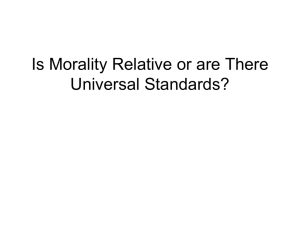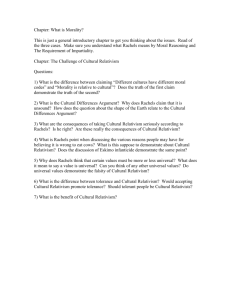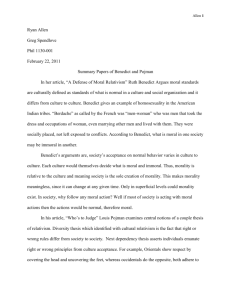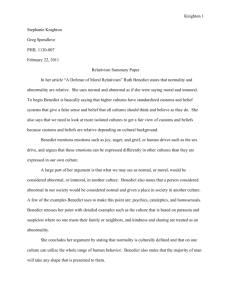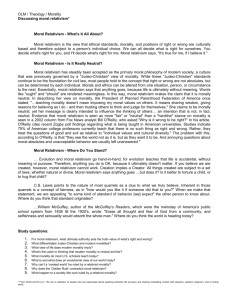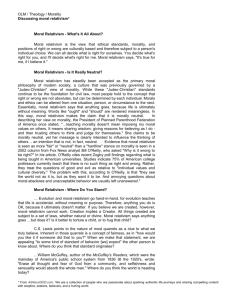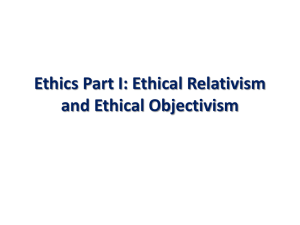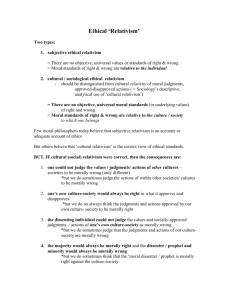Cultural Relativism
advertisement
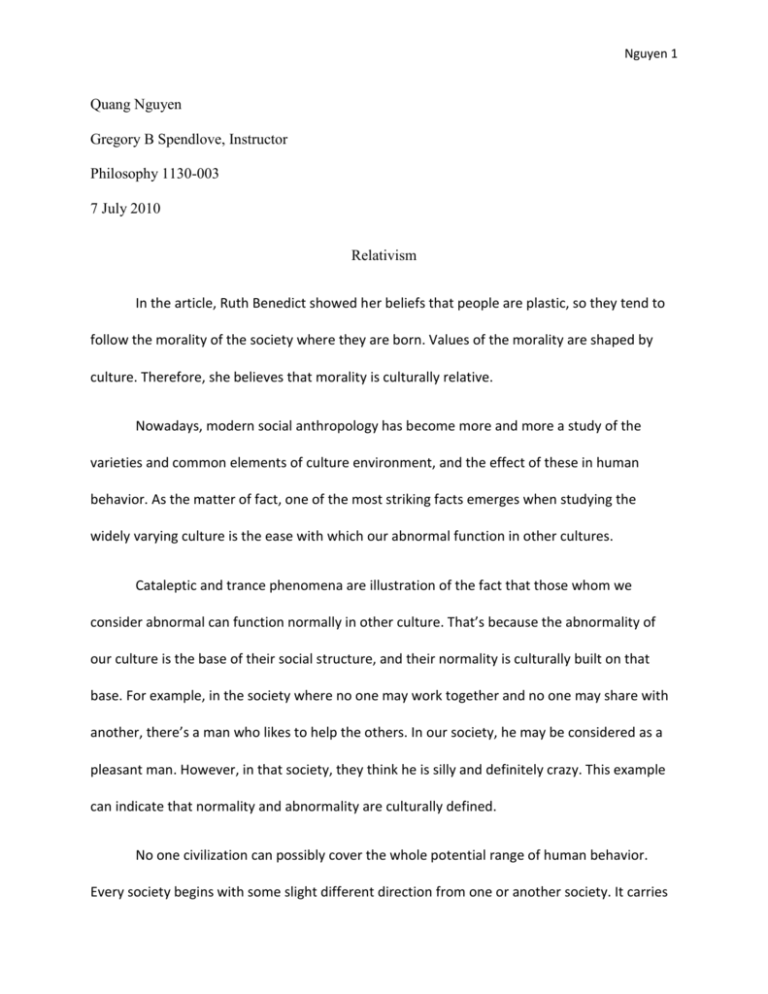
Nguyen 1 Quang Nguyen Gregory B Spendlove, Instructor Philosophy 1130-003 7 July 2010 Relativism In the article, Ruth Benedict showed her beliefs that people are plastic, so they tend to follow the morality of the society where they are born. Values of the morality are shaped by culture. Therefore, she believes that morality is culturally relative. Nowadays, modern social anthropology has become more and more a study of the varieties and common elements of culture environment, and the effect of these in human behavior. As the matter of fact, one of the most striking facts emerges when studying the widely varying culture is the ease with which our abnormal function in other cultures. Cataleptic and trance phenomena are illustration of the fact that those whom we consider abnormal can function normally in other culture. That’s because the abnormality of our culture is the base of their social structure, and their normality is culturally built on that base. For example, in the society where no one may work together and no one may share with another, there’s a man who likes to help the others. In our society, he may be considered as a pleasant man. However, in that society, they think he is silly and definitely crazy. This example can indicate that normality and abnormality are culturally defined. No one civilization can possibly cover the whole potential range of human behavior. Every society begins with some slight different direction from one or another society. It carries Nguyen 2 further and further, and then complete itself based on the chosen basic, discarding those types of behavior that are uncongenial. We recognize that morality differs in every society, and is a convenient term for socially habits. A civilization is well integrated and consistent within itself. Finally, it will initiate some particular actions which are aberrant traits in our culture. However, each of these traits will consider normal in this culture. A person whose characteristics are not congenial to that selected type of human behavior in that community is deviants, although their personality may be good in another civilization. In the article “who’s to Judge”, Louis Pojman discussed and opposed that moral truth is relative to conventional relativism or subjective relativism. He questioned “who’s to judge what’s right or wrong”, and then he replied that “we are.” For analyzing Relativism, he derives the argue that: 1. What is considered morally right or wrong varies from society to society, so that there are no moral principle accepted by all society 2. All moral principles derive their validity from cultural acceptance. 3. Therefore, there are no universally valid principles which apply to all people everywhere at all time. After that, he discussed about Subjectivism. Subjectivists believe that morality is dependent on individual him or herself. Subjective Ethical Relativism leads to absurd consequences that make morality is a useless concept because no interpersonal criticism or Nguyen 3 judgment is logically possible. Subjectivism implies that individuals only aim for their own good, and try to take the others down before they do you. However, the fact that we develop in families, mutual communities, and that we often feel for each other make subjectivism incoherent. Conventionalism claims that valid moral principles are justified by virtue of their cultural acceptance, recognizes the social nature of morality. An Anthropologist, Melville Herskovits, argued that we should be tolerant of the moralities of other cultures. However, Louis thought that that is not a good argument. He pointed out that if morality simply is relative to each culture then if that culture does not have principles of tolerance, members in that culture will be no obligation to be tolerant. Relativists fail not only to criticize those who are intolerant, but also the people who is a member in the culture that have heinous principle. Moreover, conventionalism seems to entail that the reformers are always wrong since they go against the tide of cultural standards. Sometimes the individual stand alone with the truth, but if relativism is correct, the truth is always with the crowd, the individual is always wrong. Another problem is that one person can belong to several societies with different principles. If principles in those societies are contract to each other then the action of this person will be judged both right and wrong. Finally, how large must the group be to be considered as a sub-culture or society? Conventionalism seems to be easily reduced to Subjectivism, and as we can see above, Subjectivism leads to the demise of morality. Louis Pojman then came back with three theses of relativism listed above. He argued that although Cultural Relativism seems to be the fact, but it does not by itself establish the Nguyen 4 truth of Ethical Relativism because some cultures simply lack correct moral principles. Then he questioned to imply that people can come close to the truth of scientific matters, so we can come close to the truth of moral matter. Finally, he came back with the question “who’s to judge what’s right or wrong?” His answer is “we are” with the basic of the best reasoning we can bring forth, with sympathy and with understanding. I think in both articles, the authors did a good job in presenting and defending their arguments. I especially like their examples. They are either interesting studies or popular personalities so that we can easily relate them to what the author wants to say. Besides, they go straight to the points that are needed illustrated. Therefore, it is easier to follow their arguments. In my opinion, Relativism seems to get close the truth of morality. However, there are some problems with Relativism. Is Culture Relativism can help us decide whether an action is morally right, or is it just help us decide that action is considered normal in that culture? A normal action doesn’t mean that it is morally right. For example, somehow a culture is built on the base that considers murder is normal. We know that murder is morally wrong. Therefore, in that case, although murder is culturally normal, it’s clearly not moral.


